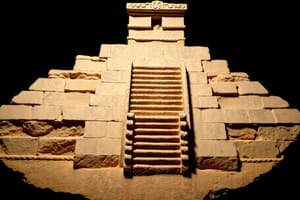Podcast
Questions and Answers
What is the traditional definition of history based on?
What is the traditional definition of history based on?
The traditional definition of history is based on written records that began to appear, emphasizing that history is limited to the literates.
How does contemporary meaning of history differ from the traditional meaning?
How does contemporary meaning of history differ from the traditional meaning?
Contemporary meaning encompasses a reconstruction of the past using not just written records, but also oral history, cultural artifacts, and folk traditions.
What qualifies a source as a primary source?
What qualifies a source as a primary source?
A primary source is a document or object created during the time under study, providing an inside view of a particular event.
Give two examples of primary sources.
Give two examples of primary sources.
What role do secondary sources play in historical analysis?
What role do secondary sources play in historical analysis?
What are tertiary sources and what is their purpose?
What are tertiary sources and what is their purpose?
What does external criticism assess in historical research?
What does external criticism assess in historical research?
Define anachronism and provide an example.
Define anachronism and provide an example.
What does internal criticism examine in a historical document?
What does internal criticism examine in a historical document?
What is corroboration in the context of historical analysis?
What is corroboration in the context of historical analysis?
Flashcards are hidden until you start studying
Study Notes
Definition of History
- Derived from Greek, meaning knowledge gained through inquiry and investigation.
- Latin definition refers to an account of the past, reliant on written documents and historical evidence.
Traditional vs. Contemporary Meaning
- Traditional: History is a record of human past starting from the advent of written records; primarily focuses on literate societies.
- Contemporary: History reconstructs the past using written records, oral history, cultural artifacts, and folk traditions; emphasizes analysis and synthesis of diverse sources.
Primary Sources
- Defined as documents or objects created during the time being studied, providing firsthand accounts of an event.
- Characterized by content rather than format, usable across original, microfilm, digital, or published forms.
- Examples include:
- Excerpts or translations
- Diaries, speeches, manuscripts, letters
- Interviews, news footage, autobiographies, official records
- Creative works: poetry, drama, music, art
- Relics or artifacts like pottery, furniture, clothing, buildings
Secondary Sources
- Offer interpretation and analysis of primary sources.
- Often include visuals or quotes from primary sources.
- Examples include textbooks, magazine articles, histories, criticisms, and encyclopedias.
Tertiary Sources
- Summarize and digest information from primary and secondary sources to provide background insights.
- Examples include dictionaries, almanacs, factbooks, directories, guidebooks, and manuals.
Types of Criticism
External Criticism
- Focuses on authenticity: verifies the form of sources to identify forgeries or hoaxes.
- Anachronism: examines the placement of persons, ideas, or items in inappropriate historical contexts (e.g., pencils before the 16th century).
Internal Criticism
- Evaluates credibility: assesses how closely the document reflects actual events.
- Corroboration: confirms details through independent testimonies from multiple reliable sources.
- Author identification: analyzes the reliability, mindset, and attitudes of the source's creator.
Studying That Suits You
Use AI to generate personalized quizzes and flashcards to suit your learning preferences.



